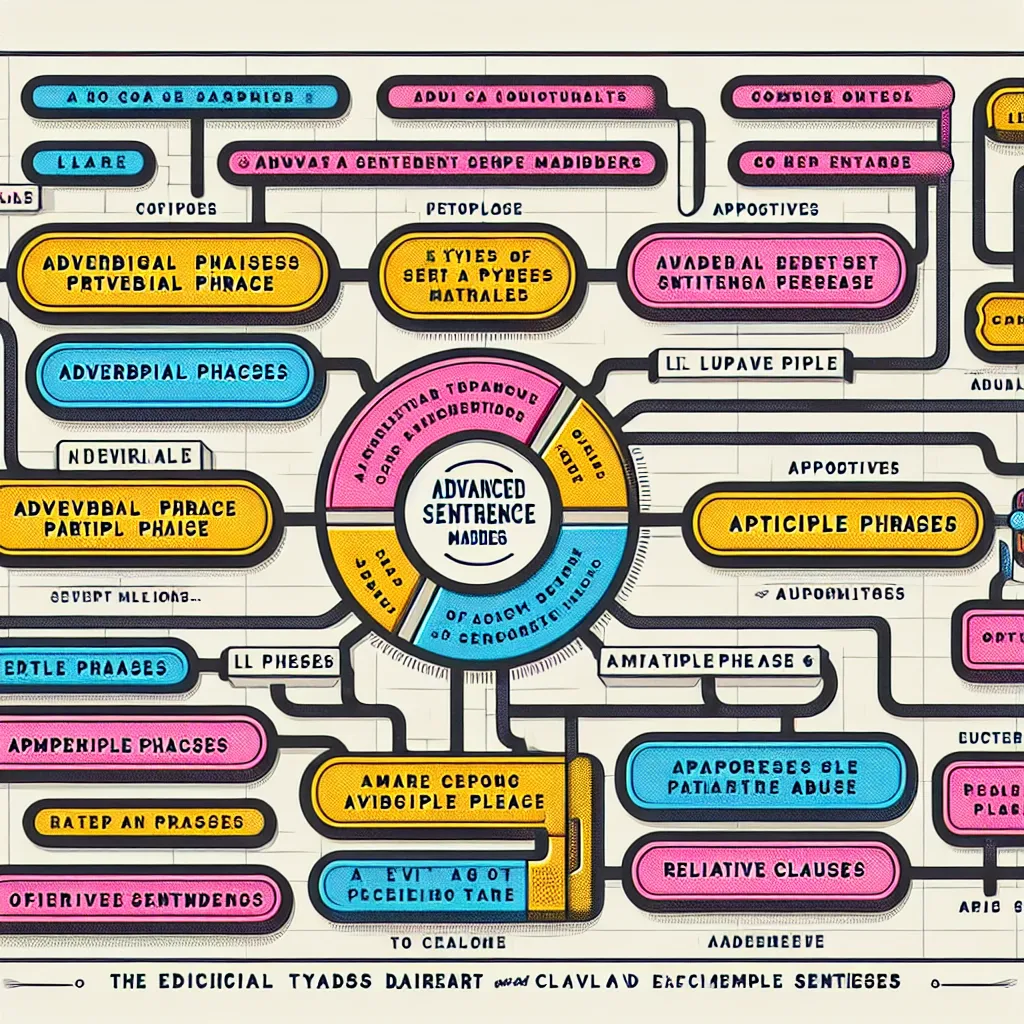Are you looking to take your English writing to the next level? Advanced sentence modifiers are powerful tools that can significantly improve the clarity, precision, and sophistication of your sentences. In this comprehensive guide, we’ll explore How To Use Advanced Sentence Modifiers effectively, providing you with practical tips and examples to elevate your writing skills.
Understanding Advanced Sentence Modifiers
Advanced sentence modifiers are words, phrases, or clauses that add extra information to a sentence, making it more detailed and nuanced. They can modify nouns, verbs, adjectives, or entire clauses, allowing writers to express complex ideas with greater precision.
 Advanced Sentence Modifiers Diagram
Advanced Sentence Modifiers Diagram
Types of Advanced Sentence Modifiers
- Adverbial Phrases
- Participle Phrases
- Appositives
- Relative Clauses
Understanding these different types is crucial for mastering advanced grammar for creative writing. Let’s dive deeper into each type and learn how to use them effectively.
Adverbial Phrases: Adding Depth to Your Sentences
Adverbial phrases modify verbs, adjectives, or other adverbs by providing additional information about how, when, where, or why an action occurs.
How to Use Adverbial Phrases
- Identify the element you want to modify (verb, adjective, or adverb).
- Choose an appropriate adverbial phrase that adds relevant information.
- Place the adverbial phrase in the correct position within the sentence.
Example:
- Basic sentence: “She sang at the concert.”
- With adverbial phrase: “With remarkable passion, she sang at the concert.”
In this example, “With remarkable passion” is an adverbial phrase that modifies how she sang, adding depth to the sentence.
Participle Phrases: Creating Vivid Imagery
Participle phrases are verb forms used as adjectives to modify nouns or pronouns. They can add visual elements and action to your sentences.
How to Use Participle Phrases
- Choose a present (-ing) or past (-ed) participle form of a verb.
- Use the participle to describe the noun or pronoun.
- Place the participle phrase before or after the noun it modifies.
Example:
- Basic sentence: “The dog chased the cat.”
- With participle phrase: “Barking loudly, the dog chased the cat.”
Here, “Barking loudly” is a participle phrase that vividly describes the dog’s action.
Appositives: Providing Additional Information
Appositives are nouns or noun phrases that rename or describe another noun in the sentence. They provide extra information about the noun they modify.
How to Use Appositives
- Identify the noun you want to describe further.
- Add a noun or noun phrase that renames or provides more information about that noun.
- Place the appositive directly after the noun it modifies, usually set off by commas.
Example:
- Basic sentence: “My brother lives in New York.”
- With appositive: “My brother, a talented chef, lives in New York.”
The appositive “a talented chef” provides additional information about the brother.
Relative Clauses: Adding Specificity
Relative clauses are dependent clauses that modify nouns or pronouns. They begin with relative pronouns (who, whom, whose, which, that) and provide specific information about the noun they modify.
How to Use Relative Clauses
- Identify the noun or pronoun you want to modify.
- Choose the appropriate relative pronoun.
- Add a clause that provides specific information about the noun.
Example:
- Basic sentence: “The book was a bestseller.”
- With relative clause: “The book, which was written by a first-time author, was a bestseller.”
The relative clause “which was written by a first-time author” adds specific information about the book.
Practical Tips for Using Advanced Sentence Modifiers
-
Vary your modifier types: Use a mix of different modifiers to keep your writing engaging and dynamic.
-
Maintain clarity: While modifiers add detail, ensure they don’t obscure the main message of your sentence.
-
Avoid misplaced modifiers: Ensure your modifier is placed close to the word or phrase it’s modifying to avoid confusion.
-
Use modifiers purposefully: Each modifier should add meaningful information to your sentence.
-
Practice with real-world examples: Study how advanced sentence modifiers are used in scientific discourse or diplomatic correspondence to see their practical applications.
Common Mistakes to Avoid
-
Dangling modifiers: These occur when the subject being modified is not clearly stated in the sentence.
- Incorrect: “Walking down the street, the trees were beautiful.” (Who was walking?)
- Correct: “Walking down the street, I admired the beautiful trees.”
-
Overuse of modifiers: Too many modifiers can make your writing cluttered and hard to follow.
-
Redundant modifiers: Avoid using modifiers that repeat information already present in the sentence.
-
Ambiguous placement: Ensure your modifier is placed close to the word it’s modifying to avoid confusion.
Exercises to Improve Your Skills
-
Sentence Expansion: Take simple sentences and expand them using different types of modifiers.
-
Modifier Identification: Read complex sentences and identify the different types of modifiers used.
-
Rewrite Challenge: Rewrite paragraphs using advanced sentence modifiers to improve clarity and detail.
-
Error Correction: Practice identifying and correcting sentences with misplaced or dangling modifiers.
Conclusion
Mastering advanced sentence modifiers is a powerful way to enhance your writing skills. By incorporating these techniques into your writing, you can create more sophisticated, precise, and engaging sentences. Remember to practice regularly and be mindful of common pitfalls. As you become more comfortable with these modifiers, you’ll find your writing becoming more nuanced and expressive.
To further improve your English grammar skills, consider exploring resources on how to improve grammar in formal emails and strategies for mastering English word order. These additional resources will complement your understanding of advanced sentence modifiers and help you become a more proficient English writer.




